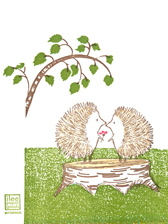

4112 24th Street
San Francisco, CA 94114
(415) 845-2337
A PARABLE FOR COUPLES
German misanthrope Arthur Schopenhauer once penned an allegory for human relationships. It went like this: A troop of porcupines were milling about on a winter day. Cold, lonely and freezing, two of them huddled close for warmth. It worked, but then their quills began to prick. Bleeding, to stop the pain they lashed out, moved apart, and again began to shiver. Cold, they moved back into the huddle, but began to bleed, and again moved apart.
Now, Schopenhauer was not a happy man. (At 25, his mother wrote to him, “perhaps it would be better if we never again met in person.") He had few experiences of good relationships, and thought it best to stay clear of them. That said, he spent his life writing about people and relationships, from the outside.
Luckily for us, there is a lot that Schopenhauer never knew. Porcupines, you see, have no quills on their tummies, and they have these wee short legs. It is possible for them to tip over and lay belly to belly, but very hard for them to sidle up to one another at just the right angle, with just the right amount of forcefulness and gentleness, to tip one another over. It takes both porcupines cooperating: if not, they’ll probably just sit there or hurt themselves. Over time, they can get better and better at this maneuver.
Couples in distress usually see each other as threats, an illusion caused by a flood of stress hormones cascading through our brains and bodies. We all can say and do unkind things when we are upset, so what starts as a cascade of stress hormones becomes real as we jab at one another, pull away or go through the motions. Seeing your partner as against you, retreating or faking is self-defeating... because in that moment it will seem that you are stuck with a partner who is, well, against you. No one likes that. This is why we recommend trying to quench the fire (defensiveness, aggressiveness, coercion, stonewalling, criticism, etc.), to say “Wait, we’re doing our dance again, that never works...”, and to to reach for the underlying feelings: the fears of being abandoned, rejected, not good enough and alone that, for most of us, drive the distress. Sometimes, those feelings are not visible. But, if distressed, it is a sure bet that they are actually there. When in doubt, perhaps ask. Or tell.
It just feels better to be not Schopenhauer’s porcupines, but to be your own porcupines.
